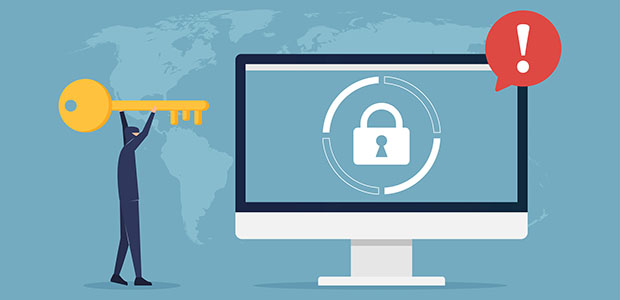
Ransomware, the top cybersecurity crime facing businesses
In recent years, the digital world has been immersed in a convulsive situation. Geopolitical conflicts, volatility in the world economy, changes in the executives of decision-making countries and the rise of exponential technologies, among other factors, have led to the creation of an uncertain global scenario where challenges and threats are increasing. In this respect, the digitalisation of industries and society as a whole has led to crimes also moving to a virtual format, with cyber-attacks being the main protagonists of this new paradigm.
In the European sphere, data kidnapping or 'ransomware' has increased by 64% if we compare the first quarter of this 2024 with that of last year, according to figures from the multinational Check Point. In fact, this criminal action was the main concern of companies in Spain in 2023 in terms of technological security, specifically for 93.9% of them.
In response to the current challenge of dealing with cybercrime, DES – Digital Enterprise Show 2024, Europe's largest event dedicated to exponential technologies, has designed the Cybersecurity Forum, co-organised by CyberLideria, where the strategies that companies, SMEs and administrations are following with a view to protecting their assets will be presented.
Names of the stature of Jesús Mérida, Director of Information Security at Iberia; Rosa Kariger, Global Security Analysis & Prospective at Iberdrola; David González, CISO & CTO at Coren; Javier Sánchez, CISO at the energy company Engie España; Josep Bardallo, Cybersecurity Manager at the company specialising in electronic security, A2Secure; Sergio Padilla, CDO of the Bank of Spain, and Esther Mateo, Director of Processes and Security at Adif, will discuss at DES the complexities of digital surveillance in a hostile landscape characterised by the high interest in data.
Cyberstrategies with exponential technologies
Cybersecurity, as is the case in different economic fields, is adapting to the emerging dangers of today. It is for this reason that the methods for combating virtual criminals already integrate AI, Machine Learning, quantum computing and biotechnology, among other solutions, with which it is possible to adapt to the intensity and volume of offensives. Maite Arcos, General Director of Fundación Esys, dedicated to research, analysis and dissemination of ideas on comprehensive security; Rafael Bolívar, CISO of Enagás, and Francisco Gallardo, Global Navigation Satellite System Engineer at the Institute for Space Applications of the German Aerospace Centre, will be in charge of exploring the intersection between recent technological tools, such as AI, and cyberattacks. Precisely, AI will be discussed by Lucero Ramos, CISO of Idealista, and David López, partner at Fhios Smart Knowledge, in order to expose the potential of the solution with the purpose of being more resilient.
In addition, with the aim of explaining the essential steps to effectively manage a crisis, Iván Monforte, Head of Communication, Ecosystem and Cybersecurity Culture at the Cybersecurity Agency of Catalonia, will evaluate, together with José Andrés Jiménez, Head of the ICT Technical Advisory Department of the Congress of Deputies, the most effective strategies with which to respond once they have been assaulted, from the operational response to external dissemination tactics.
The importance of cybersecurity for clinical data
One of the sectors that is particularly sensitive due to the vulnerability of the data it handles is the healthcare sector. For this reason, DES2024 will be discussing the objectives pursued in this field with a view to blocking medical records from criminals, while at the same time sharing this information to improve processes and cross-border clinical care. Juan Diez, Head of Cybersecurity for the strategic industries of Health, Food and Research at the National Institute of Cybersecurity, will study the effects of the European Health Data Space, which in the not too distant future aims to build a community structure with a view to facilitating access to patients' health content, provided it is for therapeutic purposes.
In turn, the summit will feature leaders such as Marwa Al Mansoori, Head of Business Development and Government Relations at Siemens Middle East and member of the Board of Directors of the Abu Dhabi Chamber of Commerce and Industry; Natalia Rodríguez, CEO and founder of Saturno Labs, recognised with the National Innovation Award 2023, awarded by the Ministry of Science; César Alonso, member of the Board of Trustees of the Foundation that fights against childhood leukaemia, Unoentrecienmil; and Almudena de la Mata, CEO of the Blockchain Intelligence training platform; César Alonso, member of the Board of Trustees of the Foundation that fights against childhood leukaemia, Unoentrecienmil, and Almudena de la Mata, CEO of the training platform Blockchain Intelligence, who will analyse, from the perspective of innovation, the application of exponential technologies in the area of health while maintaining the values of humanism and security.
They will be joined by Daniel Ribas, Project Manager at T-Systems Iberia in the healthcare field, who will give his vision of the role of AI algorithms in processing large amounts of user data, providing real-time information and aiding decision-making. Continuing with AI, Juan Ramón Segura, Iberia Digital & Innovation at Sanofi, will use DES to detail the advances of iCardio, a pioneer in eHealth, and to delve into how artificial intelligence is revolutionising healthcare delivery and biomedical research.

